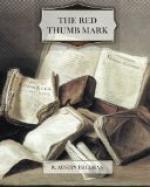“It is,” I agreed. “My merits are grossly undervalued by a stiff-necked and obtuse generation. But what would you have, my learned brother? If poverty steps behind you and claps the occulting bushel over your thirty thousand candle-power luminary, your brilliancy is apt to be obscured.”
“Yes, I suppose that is so,” grunted Thorndyke, and he remained for a time in deep thought.
“And now,” said I, “let us have your promised explanation. I am positively frizzling with curiosity to know what chain of circumstances has converted John Evelyn Thorndyke from a medical practitioner into a luminary of the law.”
Thorndyke smiled indulgently.
“The fact is,” said he, “that no such transformation has occurred. John Evelyn Thorndyke is still a medical practitioner.”
“What, in a wig and gown!” I exclaimed.
“Yes, a mere sheep in wolf’s clothing,” he replied. “I will tell you how it has come about. After you left the hospital, six years ago, I stayed on, taking up any small appointments that were going—assistant demonstrator—or curatorships and such like—hung about the chemical and physical laboratories, the museum and post mortem room, and meanwhile took my M.D. and D.Sc. Then I got called to the bar in the hope of getting a coronership, but soon after this, old Stedman retired unexpectedly—you remember Stedman, the lecturer on medical jurisprudence—and I put in for the vacant post. Rather to my surprise, I was appointed lecturer, whereupon I dismissed the coronership from my mind, took my present chambers and sat down to wait for anything that might come.” “And what has come?” I asked.
“Why, a very curious assortment of miscellaneous practice,” he replied. “At first I only got an occasional analysis in a doubtful poisoning case, but, by degrees, my sphere of influence has extended until it now includes all cases in which a special knowledge of medicine or physical science can be brought to bear upon law.”
“But you plead in court, I observe,” said I.
“Very seldom,” he replied. “More usually I appear in the character of that bete noir of judges and counsel—the scientific witness. But in most instances I do not appear at all; I merely direct investigations, arrange and analyse the results, and prime the counsel with facts and suggestions for cross-examination.”
“A good deal more interesting than acting as understudy for an absent g.p.,” said I, a little enviously. “But you deserve to succeed, for you were always a deuce of a worker, to say nothing of your capabilities.”
“Yes, I worked hard,” replied Thorndyke, “and I work hard still; but I have my hours of labour and my hours of leisure, unlike you poor devils of general practitioners, who are liable to be dragged away from the dinner table or roused out of your first sleep by—confound it all! who can that be?”
For at this moment, as a sort of commentary on his self-congratulation, there came a smart rapping at the outer door.




